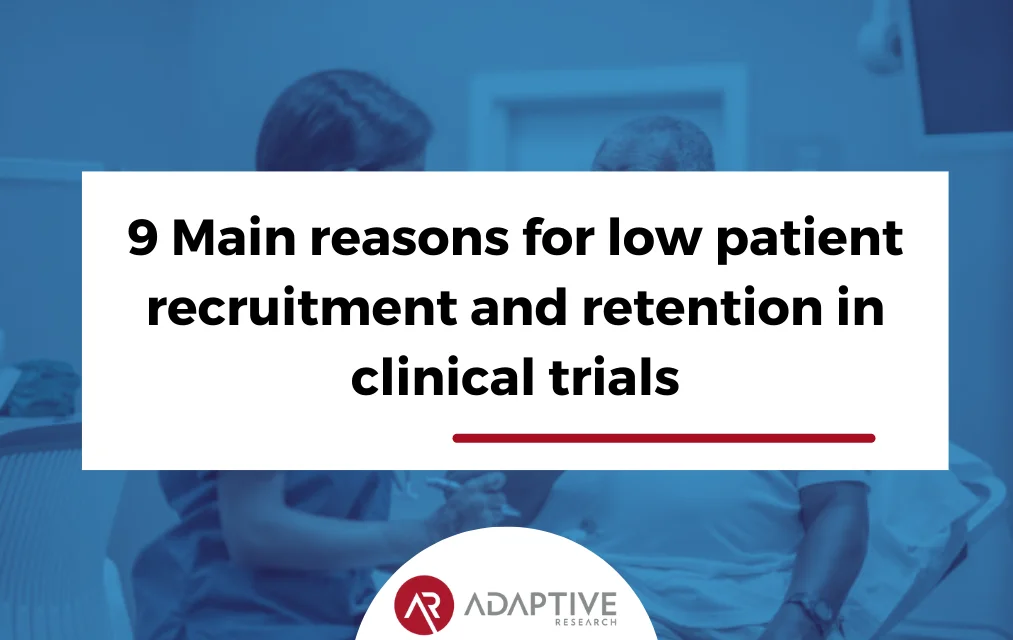Adequate patient enrollment and retention are critical to the successful execution of a clinical trial. But, they are among the most demanding variables to control, with the average dropout rate across all clinical trials hitting around 30%. Even though patients are free to drop out from any clinical trial, this hinders new medical inventions.
On average, it costs $6,533 to recruit a patient to a clinical study, and the average cost of recruiting a new patient if one is lost due to noncompliance is $19,533.
In this blog, we explain why it’s challenging to find people to participate in clinical trials and why they leave before accomplishing their intended purpose.

What are the 9 major reasons for low patient recruitment and retention in clinical trials?
1. Covid 19 has worsened the difficulties of trial participant recruitment and retention.
The challenges of trial participant recruitment and reservation have been intensified by COVID-19. Researchers point to patients’ heightened unwillingness to enroll in new trials, patient dropout, and noncompliance linked to travel restrictions and quarantined locations.
Based on a study organized by Continuum Clinical, 39% of sites surveyed in the USA stated they believe trial participants will be much less or a bit less likely to join the newest clinical research trials. Other considerations include elevated patient anxiety, hesitancy to visit healthcare facilities, and contamination risk between patients, sites, and the community.
2. Failure to see and appreciate the value of clinical trials due to personal reasons
Suppose a patient feels like a number rather than an individual making a meaningful contribution to the clinical trial. In that case, they are most likely to drop out or hesitate to participate in future clinical trials.
Most people are reluctant to participate in clinical trials because of the complex and highly demanding protocols they entail. People thus consider participating in clinical trials as burdensome in terms of the number of visits to hospitals and the time they should spend at the participant recruitment sites.
These reluctant people dread the procedures they must participate in, such as collecting biological samples and the requirements to withhold standard treatment, which would otherwise already have been started outside clinical trials.
Moreover, patients with chronic illnesses such as cancer may be emotionally and physically overwhelmed by the trials and therefore remain reluctant to participate.
3. Funding related limitations
Recruitment of clinical trial participants typically takes longer than anticipated. However, budgets for investigator-initiated clinical trials are usually tight without a buffer for a more extended trial period. Failure to acquire additional funds usually leads to the premature discontinuation of clinical trials.
4. Overestimation of patients by investigators
Investigators can overestimate the number of people required to participate in clinical trials. The investigators sometimes fail to understand how large the corresponding patient population is, the number of people needed from this population, and how many will participate.
5. Overly restrictive participant inclusion criteria
Even though inclusion and exclusion criteria are essential for the validity and reliability of trials, potentially willing clinical participants will quickly be turned away if they are too stringent. This can happen even though participants have the minimum requirements for participating in the clinical trials.

6. Patients’ lack of awareness about the clinical trials
In most cases, the difficulty in finding people to participate in clinical trials stems from a lack of awareness. Patients suffering from a particular disease under clinical investigation are not told about the clinical studies by their physicians.
Also, some patients may be reluctant to participate in a clinical trial because they don’t trust it. They only want words of encouragement from their physicians to motivate them to join the clinical trials.
Studies indicate that patients having high education levels are more likely to consent to participate in clinical trials. In contrast, social limitations such as language barriers and cultural differences can block recruitment, especially of new immigrants.
7. Burdensome paperwork for participants
Clinical trial participants can be overwhelmed when they are required to keep a diary for several months or if they must fill in multiple questionnaire pages. This can discourage them from participating in future trials or from continuing with the current ones.
A clinical study can be time-consuming and exhausting for patients with physical and mental restrictions. These patients include the elderly, those who have Alzheimer’s disease, and children. Such patients may need another person to assist them with filling in the paperwork.
This can cause many people to drop out or fail to join the clinical investigations.
8. Participants hate that they must put in more effort
In nearly all clinical trials, participants must put in more effort in the form of multiple visits to their doctors. This is usually characterized by long waiting times, and most patients hate that they are required to come with a caretaker during their visits to the doctors as they may incur additional costs in terms of transport and food.
Also, many potential participants live far away from the study sites, or they are busy with their full-time jobs and cannot spend time on the frequent clinical study visits at the specified site. Additionally, clinical trial participants are subject to regular invasive medical testing, characterized by stool samples, MRIs, CT scans, etc.
9. Fear of taking placebos
Some participants fear being categorized under the placebo group and only want to be classified under the control group. Of course, since this can’t happen, the ones categorized under the Placebo group can immediately reject participating in the clinical trials.
Placebos have been utilized in clinical trials for an extended period and are an integral component of research into new treatments. Placebos are utilized to test the effectiveness of new health care treatments such as a new kind of medication. For ethical reasons, people participating in clinical trials are informed that they may be given a ‘dummy’ treatment.
Typically, a group of people takes the medication while another group (the control group) takes the placebo, mostly a sugar pill.
Sometimes, people are reluctant to participate in clinical trials because neither they nor the researchers know whether they are taking active or inactive (placebo) medication. This is called a double-blind test.
Conclusion
There are different reasons why it’s challenging to find people for clinical trials. As discussed, some reasons are linked to personal choices, clinical research limitations, fear of taking placebos, the extra effort needed to invest in the trials, burdensome paperwork, overly restrictive participant inclusion criteria, funding-related limitations, lack of awareness about the clinical trials, and over-estimation of patients by investigators.
Additional Sources
https://www.gopraxis.com/patient-dropout-why-it-happens-and-how-to-prevent-it/
https://zak-services.com/7-reasons-clinical-trials-not-recruiting-enough-patients/
https://www.betterhealth.vic.gov.au/health/conditionsandtreatments/placebo-effect
https://mdgroup.com/blog/the-true-cost-of-patient-drop-outs-in-clinical-trials/






